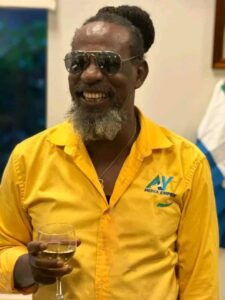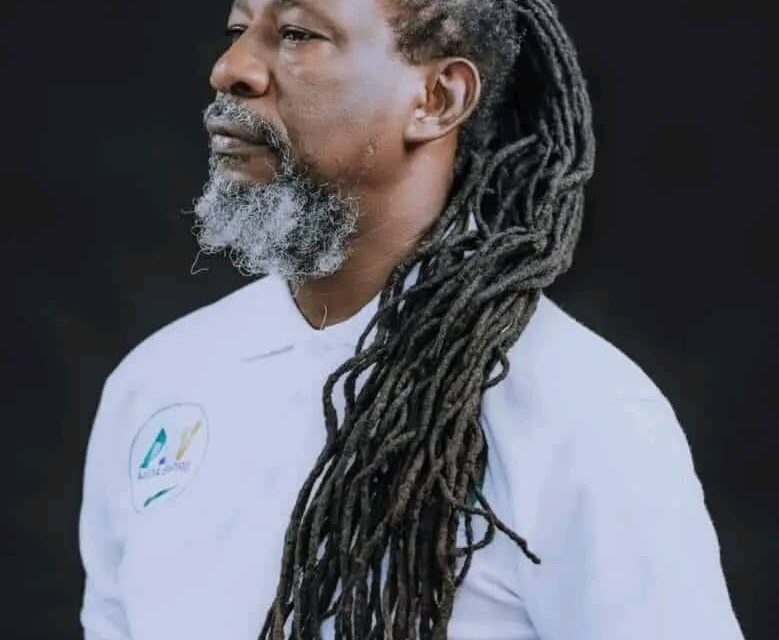By: Emmanuel Mbowa
One of Sierra Leone’s most celebrated journalists, Mamajah Jalloh, popularly known as DJ Base believes he has raised public awareness by at least 60% over his more than two decades in the media industry.
Throughout his career, Base says his mission has remained consistent: to instill positivity and ignite civic consciousness among Sierra Leone’s youth. His platform has long been a space for advocacy, against child abuse, assault, and sexual and gender-based violence across the country.
But has this dream of uplifting young people through media and messaging truly been realized?
“I would say, through my ‘Night Live’ shows and my continuous moderation in the media, if not 70%, then at least 60% of Sierra Leoneans have become more aware of governance, civic responsibility, personal growth, and community development,” Base asserts. Then, flashing a broad smile, he adds, “As I always say, ‘if you nor get sense, die wan tem’-meaning one might as well die than remain unaware of the issues.

DJ Base, now a household name, began his journey as a disc jockey while attending Sierra Leone Grammar School. “My initial objective was to entertain people as a DJ,” he recalls. “I never imagined I’d end up in radio broadcasting. But after the war, I found myself at 98.1, Radio Democracy.”
His career began to flourish at 98.1 when he was selected from a pool of twenty candidates. “I started working night shifts, and was later invited by Patrick Coker, then communications lead at UN Radio, to moderate their programs. That’s how UN Radio gained popularity, by making my shows more participatory and interactive, with phone-in segments.”
Since 1999, amid the civil war, Mamajah Jalloh’s approach to journalism has been widely praised for its blend of professionalism and ‘info-tainment’, a style that drives both social and personal transformation. “For instance, Moses Mambu, the newly elected SLPP Publicity Secretary, recently called to commend me for the impact my work had on him since his school days. And he’s not alone, many others reach out to thank me.”
Still, some wonder why DJ Base hasn’t ventured into politics or other sectors, as several of his peers have risen to prominent positions and now enjoy the privileges of influence. Is journalism so compelling that he’s held onto it for 24 years, while others partake in the national cake?
“My main focus was always to create awareness and make people happy,” he reflects. “But I also wanted to lay my own foundation. And by God’s grace, I’ve been able to build my own house through my earnings from journalism.”
After eleven years of brutal civil war, Sierra Leone’s media space has become a vital force in shaping the country’s socio-political and economic fabric. Through meaningful initiatives and bold interventions, the media has promoted national growth by upholding truth and holding high-profile figures and government officials accountable.
In recent years, its agenda-setting role has commendably advanced transparency and dignity across all sectors unearthing hidden truths buried beneath layers of corruption, self-interest, and institutional neglect by politicians, civil servants, law enforcement officers, and even the citizens they claim to represent.
While the media often facilitates and amplifies the efforts of both state and non-state actors, it has also positioned itself as a watchdog monitoring operations across all facets of society. This role, courageously embraced by journalists like Umaru Fofanah, Amadu Lamrana Bah, Thomas Dixon, and Melvin T. Mansaray, has exposed them to threats, harassment, provocation, humiliation, and even physical abuse, often from the very institutions they engage with.
DJ Base, too, has faced his share of intimidation. “It’s like a two-way thing,” he says with a knowing smile. “While I was creating awareness, politicians were busy trying to sway the people in the opposite direction and make me look bad, you know.”
Still, he remains grateful. “Let people know you for something and let it be positivity,” he insists. “I appreciate everyone who’s done songs about my journey and impact. Thank you to those at home and abroad.” He plays one of those songs, and it sends a chill through the studio I find myself tapping my index finger on the panel table, moved by the moment.
One persistent challenge for genuine journalists is the tendency of frustrated political party members to label them as loyalists or ‘Lay belleh journalists’ those who allegedly work for ruling or opposition politicians under the guise of being critical voices. But being constructive and uncompromising doesn’t make one a ‘Lay belleh’ journalist. That’s a personal conviction.
Mamajah Jalloh has often been branded an APC journalist when SLPP is in power and vice versa. It’s an age-old issue in Sierra Leone’s media landscape. But he remains focused. “There are rumors,” he admits, “but I’ve never been approached directly to join any political party. If I ever consider it, it’ll require careful thought.” He smiles warmly. “It’s all about ‘Conscious Vibes: Awareness Age.’ Once people are educated, they’re more likely to make informed choices.”
Base’s unique blend of entertainment and information has drawn thousands if not millions of listeners over the years. “It amazes me when people appreciate my work but don’t even know me,” he laughs softly. “The vibe is there, and people feel it.”
Sierra Leone’s media has evolved, making information more accessible across tribes, regions, and walks of life. For Mamajah Jalloh, it’s not just about the vibes, it’s about helping people confront reality and challenge the narratives society has fed them. The rise of new media has empowered journalists to deliver timely news and keep citizens informed on politics, governance, economics, and more.
“I often see people on social media reflecting on the importance of change, quoting my messages from ‘awareness time,” he shares. “With the pace of technological change, if you’re not conscious, you’re out.” He chuckles, recalling a past interview: “I told Lamrana Bah, if you’re mediocre, just be deceased.”
Now approaching 54, DJ Base has no plans to retire. But he wonders: what more civic change can he champion when some Sierra Leoneans are busy sabotaging the country’s future importing dangerous drugs into a nation of just 8.5 million?
If 60% of youth are now more aware and capable of making informed decisions, could they rise to safeguard the nation’s future? Or should Mamajah Jalloh enter politics to push that figure to 100%?
It’s not just about his willingness, it’s about the ripple effects such a move could cause. Many believe the media is often a stepping stone into politics. “No, I don’t intend to go into politics,” he clarifies. “I don’t want to go out of context, but trust me, if I were affluent like Jagaban, I’d focus on investment and philanthropy, not politics.”
His journey is marked by courage and consistency. Yet he’s deeply troubled by the rise in drug abuse, theft, and crime among youth. “To young people, stay out of drugs,” he pleads. “The rate of abuse is alarming. We’re losing society.”
His message resonates across Sierra Leone’s demographic spectrum. He urges leaders of non-governmental institutions to speak out. “The Inter-Religious Council must condemn what’s wrong, especially human rights violations and threats to our future,” he says. “Their silence is deafening.”
He believes churches and mosques must use their platforms to preach truth even when it’s political. “They must instill honesty and integrity in people, whether in government, schools, or communities.”
DJ Base also calls on politicians to serve with sincerity. “The step you use to climb higher is the same step you’ll use to climb back down to the people you left,” he says pointedly. I nod in agreement and so would you.
He commends Amadu Lamrana Bah and others who are building empires of truth and trust. “Congratulations to Lamrana Bah! He’s a good brother. I’ve worked with him. I wish him nothing but the best.”
The perception of media as poor has made it a target for powerful figures who lure young journalists with flashy offers and meager positions, undermining the industry’s potential. “Media poorness is real,” he admits, “but integrity isn’t cheap.”
“I can still play a key role without being a politician,” he affirms. “It’s not that we don’t want flashy cars or mansions, no! But you must know your limits. Life is about peace and what makes you happy.”
And with that, he closes: “This is what I do. I’m not ready to resign or move into politics, though I might consider it. But for now, I am DJ Base, the man with conscious vibes.”










I got this web page from my pal who informed me concerning this site and at the moment this time I am visiting this site and
reading very informative articles or reviews at this time.
cam chat online instant chat online
бонусы казино бонусы казино